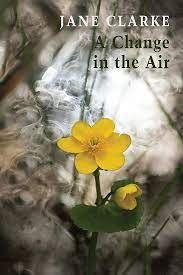A Change in the Air (SHORTLISTED, TS Eliot Prize 2023)
Jane Clarke
(Bloodaxe Books, 2023); pbk £ 10.99
This is Jane Clarke’s third poetry collection. Her previous work has been nominated for several poetry prizes, including being shortlisted for the Royal Society of Literature’s Ondaatje Prize, awarded for a distinguished work of fiction, non-fiction or poetry evoking the spirit of a place. The latest collection certainly does that.
The cover shows a photographic image of a marsh marigold, with a blurry pond in the background, highly suggestive of a cool, boggy landscape. The glossy cover, however, gives the impression of a book and writer not to be taken seriously. Nothing could be further from the truth. Even at first glance, the poems are arresting.
The collection is structured in six sections, some with titles, others grouped in loose themes. This could be problematic, but on reading the poems, they flow naturally into one another. Most are short and structured as non-rhyming couplets.
In the first section, unnamed, the poem ‘Raspberries’ describes the poet and her aging mother picking raspberries for jam. Her mother reminds Jane to use sugar and berries pound for pound.
says I must remember
because something
has slipped her mind
and every night,
like a stoat among voles,
It hunts down her memories.
The second section, named ‘The Pit Ponies of Glendasan’, looks back to the times when lead was mined in the Wicklow region of Ireland. The sequence was inspired by interviews with former miners. ‘In The Pay’, a miner recounts his work underground.
I’d like to tell you I felt no fear
But every hour under Camaderry
Was an hour too close to rockfall
Jackhammer pounding, dynamite roar[.]
Even the indented second couplet suggests something teetering on the edge, about to collapse.
There is a typographical error in the third section’s title. In the Contents page, this section is named ‘When All this is over’; however in the text, the title is ‘All the Way Home’. This is a serious error for a publisher as renowned as Bloodaxe. The section deals with the First World War and Clarke mentions in her noted in the last pages of the book that it ‘honours the 210,000 Irish soldiers who fought and 40,000 who died’. In the poem, ‘Bouchavesnes’, the soldiers are digging graves for their comrades.
a soldier thinks of his grandad
digging potatoes —
wait till the vines have died down,
He’d say, be sure to dig gently
or you’ll bruise the tubers that huddle
like hens’ eggs under the mound.
Then let your shovel lift
seven, eight, nine, into the light.
‘You Could Say it Begins’ is the title of the fourth section and the only longer poem. It traces the border between Northern Ireland and the Republic. The poem has a distinct rhythmic motion as it describes rivers, loughs and villages through which the border runs. Near its eastern end, the border
…shins up the summit of Clermont Mountain,
falls to the County Bridge and through the mouth
of the River Newry into the sea at Carlington Lough
where you could say it ends, or maybe it begins.
Other poems in this section deal with the conflicts that Ireland has been through and the effect these have had on successive populations.
The final sections of the collection are untitled, but the fifth contains poems about landscape and nature. ‘The Dipper’ is a beautifully accurate portrait of this bird. The poet is walking up a river’s edge when she spots the dipper.
I think I’ve lost you —
but beyond clumps of sedge
and withered asphodel,
little blacksmith,
you bob on an anvil.
Droplets fall from your bib.Again, the poet uses the structure and layout of the poem to convey the motion of the bird.
The sixth section deals with her relationship with her wife. It seems a fitting way to close the collection—a spiritual and emotional homecoming for Clarke.
Jenny Gorrod


I haven’t read the collection yet, but I look forward to doing so. Thank you for the review! I’m just curious about that typographical error. I wondered if the poet was making a point about changed and perhaps mistaken expectations, for example? It does seem an odd error in context, and Bloodaxe is generally sharp indeed. It’s hard to believe it would have reached this stage without even an erratum slip. I don’t know. But without that slip, I wonder. Once again thank you for the review.